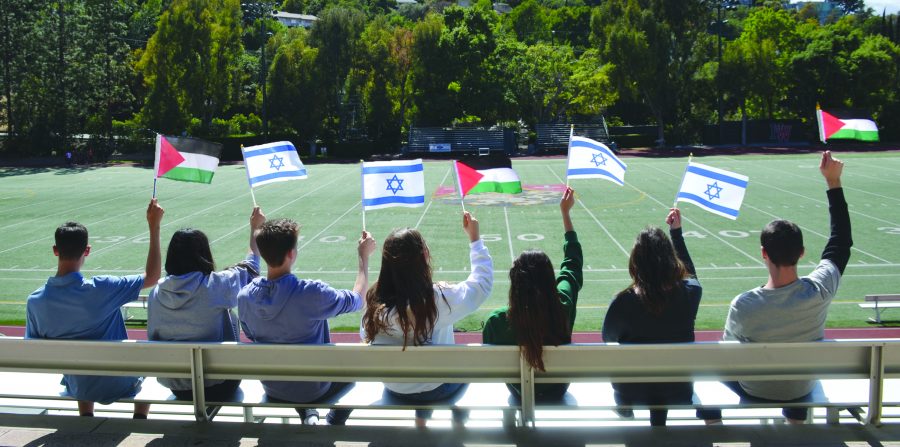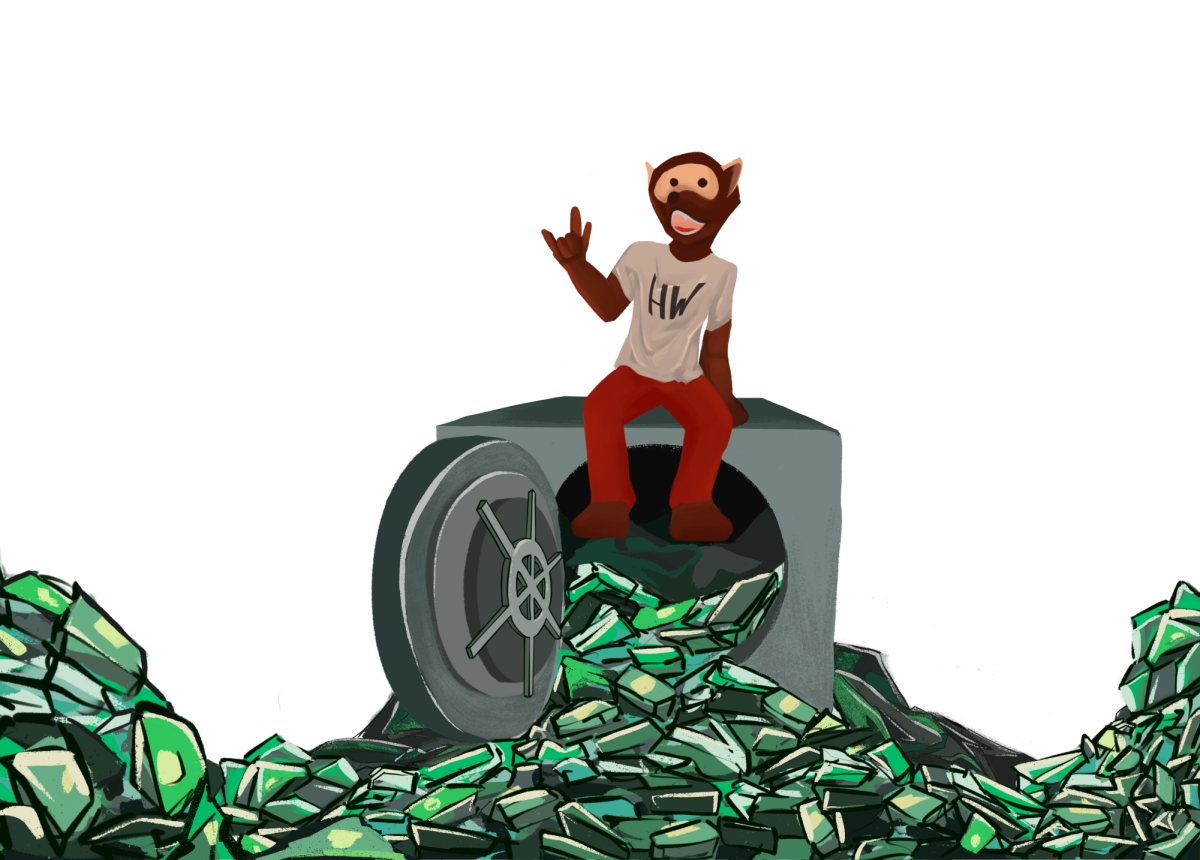Looking out over miles of green atop a mountain in the Golan Heights while on a family trip to Israel, Lisa* ’19 was surprised to see a harsh line in the distance that abruptly separated rich greenery from miles of bare, arid land beyond it. After talking to her tour guide, Lisa realized that she was looking at the Israeli-Syrian border––the green side was Israel, and the barren side was Syria.
Her tour guide explained that Israel had developed an advanced irrigation system to make up for their lack of water, and they offered to share this system with neighboring countries, including Syria, who rebuffed the offer on principle, Lisa said.
“The thing that really stuck out at me about that experience was that Israel was trying to improve [Syrian] living conditions, but Syria is rejecting it just based off of what Israel is,” Lisa said.
After learning of Israel’s attempts to cooperate with neighboring countries, Lisa said that her visit helped shape her generally pro-Israel stance today in the Israeli-Palestinian conflict.
“When I was in Israel, I talked to people who made me realize that Israel is really trying,” Lisa said. “I’ve heard people’s experiences of Palestinian suicide bombers in pizza shops, killing civilians. I learned a lot about Israel’s defense system and how Israel is really based on defense rather than offense, in trying to protect their own borders and protect themselves, rather than trying to go out of the way to kill other people.”
After her experiences in Israel, Lisa said she felt that many people did not have proper context when forming their opinions on the issue.
“Israel is not perfect, but in general what they’re doing is because they have these neighbors who would rather they not exist at all and would rather they be dead,” Lisa said. “A lot of the press [coverage of the issue] here is really one-sided.”
Lisa said that she finds media especially critical of Israel, which she attributes to liberal tendencies.
“I consider myself to be a liberal person and a Democrat, and most of my views align with [those of the] Democratic Party,” Lisa said. “However, something I’ve noticed is that in a lot of cases, liberals tend to want to favor the underdog. Gaza is often presented as the underdog because they’re not the established country. If you are only hearing the very surface level of news, which I think a lot of people do, you would be likely to sympathize with them without realizing that Hamas wants to kill Jews and wants Israel to not exist.”
Hamas is a Palestinian Islamic group that won elections in 2006 to occupy the Palestinian National Authority in Gaza and calls for the dissolution of Israel.
Despite being the primary political group in Gaza, Hamas is recognized by the European Union as a terrorist group.
In reference to recent protests on the Gaza border, Middle East Studies teacher Dror Yaron said he agrees with Lisa that the media does not portray the conflict accurately.
“I don’t like the fact that the media has been complicit in calling these protests peaceful, when in fact there have been many attempts, not only to breach the border, but to do so violently,” Yaron said. “We’re not just talking about Molotov cocktails, we’re talking about sporadic shooting, [improvised explosive devicebombs], weapons from machetes to knives and chants to kill Jews.”
He also said he believes that this negligence by the media sends a message to Hamas that their violent actions against Israelis were successful.
“The West has sucked up a narrative, an image and symbolism, which is profoundly misguided,” Yaron said. “This is what Hamas wanted. They wanted a public relations victory. [The media] is giving a public relations victory to terrorists, and it’s only going to inspire them to precipitate and exacerbate something that works.”
In contrast to Lisa and Yaron’s belief that the media fails to contextualize events in the region with the fact that Hamas is recognized as a terrorist group, Adam* ’19, who identifies as Pro-Palestinian, said he feels the media emphasizes this fact too much.
“I’m personally against Hamas, but I think that the media tends to only cover when Hamas attacks,” Adam said. “When Israel launches missiles, occupies land or blows up hospitals or schools, we don’t really hear about that. I think that the Jewish people deserve a homeland, but I disagree with [not seeing the whole picture] with what’s happening between Israel and Palestine, especially in the Gaza Strip.”
When Adam formulates his stance on events that occur within Israeli or Palestinian territory, he said he makes sure to do his research before solidifying an opinion.
“Whenever a headline comes about what happened within Israel and Palestine, I’m not quick to judge,” Adam said.
Overall, Adam said no one event has defined his opinion on the issue, and he believes that everyone should continuously evaluate situations that may erupt.
Similarly, Sophie Levy ’18 said she tends to be more critical of Israel and supportive of the Palestinian cause but makes sure to consider both sides of the issue.
Growing up in a strongly pro-Israel environment, Levy said it wasn’t until she became a teenager that she realized she wanted to revisit the Israeli-Palestinian issue. After that point, Levy made the decision to educate herself on current and past events that relate to the conflict in addition to reading a wide range of sources to avoid excessive bias, she said.
“I believe that Jews, Palestinians and other smaller populations in that region all have valid claims to the land and that the development of a pluralistic society should be our goal,” Levy said “I strongly prioritize fair criticism and approach the whole situation from a post-colonial, analytical perspective, because it really can’t be distilled to a black and white conflict.”
Next year, Levy will attend Barnard College, which has recently divested from Israel, meaning that they have pulled out any investments or business they had in the country.
The student body voted to divest as a sign of protest against what they perceive to be Israeli occupation, which Levy said she agrees with on principle.
In college, Levy said she plans to continue researching the Israeli-Palestinian issue in an academic setting and hopes to get involved with Jewish anti-occupation organizations.
Sylvie Sanders ’17 currently attends Barnard and was involved in efforts to stop the divestment and continues to participate in Aryeh, a pro-two state, or Israeli support club that argues against anti-occupation organizations on campus.
Sanders’ involvement in the conversations about the Israel-Palestinian conflict began after she received an anti-semitic remark at college, she said.
“It was my first personal exposure to antisemitism,” Sanders said. “Throughout the school year, I felt less and less safe being a Jewish student at Barnard. I had never really connected with my Jewishness. I’m an atheist, but this has been a wake-up call.”
In the wake of Barnard’s divestment from Israel, Sanders said she finds that the student body does not inform themselves when forming an opinion on the issue, but instead sides with what they believe to be liberal ideologies.
This blind dedication to anti-Zionist movements on campus also spreads anti-semitism, she said.
“People claim anti-Zionism and anti-semitism are separate, but most of the time, that’s not the case,” Sanders said. “Anti-Zionism serves as the perfect vehicle for anti-semitism’s spreading and a great cover.”
Sanders said she believes in an Israeli homeland, in part, because she believes Israel is a relatively positive force in the region.
“Israel provides aid that the Palestinian government doesn’t provide to its civilians,” Sanders said. “Palestinian officials are horrible to their civilians. The Palestinians deserve better than that. Most are innocent people. Additionally, Israel is also by far the most liberal country in the Middle East. Women’s rights are taken very seriously there and so many medical and technological advances arise from Israel. It really is a powerhouse.”
Ultimately, Sanders said she acknowledges that the issue is contentious and believes in the right of both states to exist.
Adam also said that the issue is too complex for one event to shape an opinion. He said he believes both views are valid and deserve to be heard.
“This is an issue that you have to look at [from] many perspectives,” Adam said. “We should value the two views equally and consider what both sides are saying.”
*Names have been changed.





































